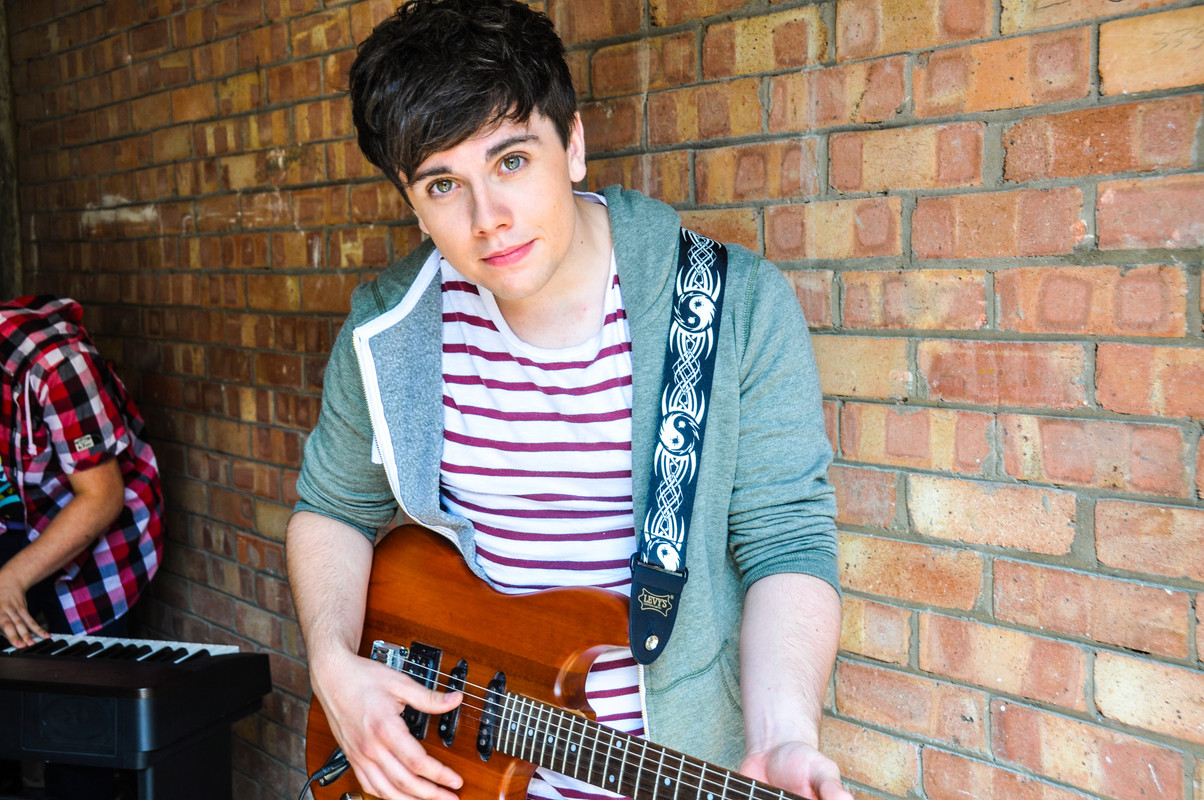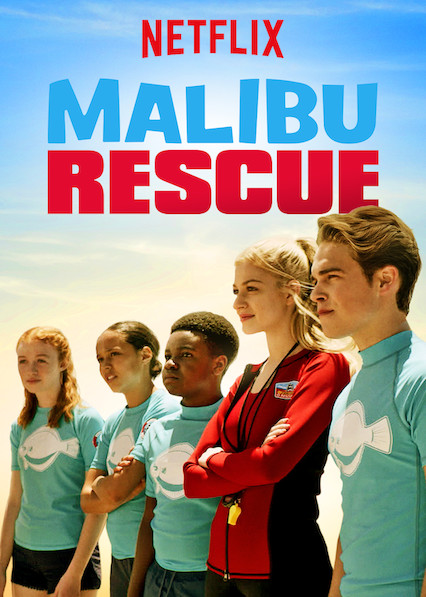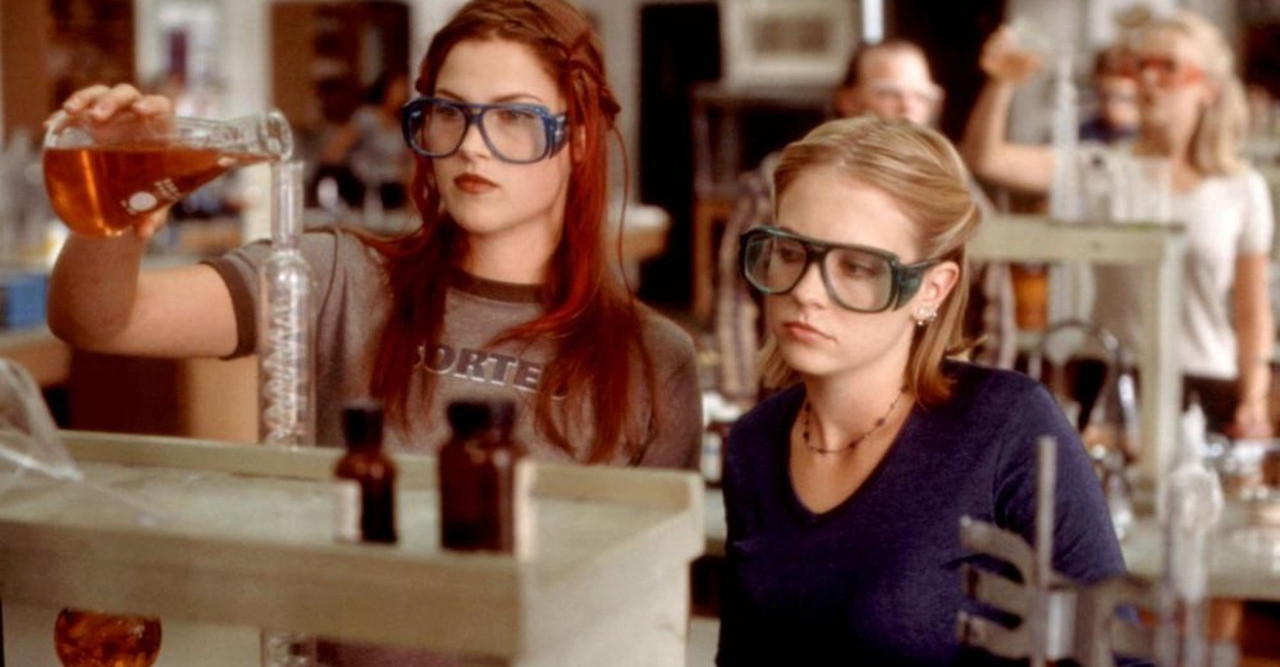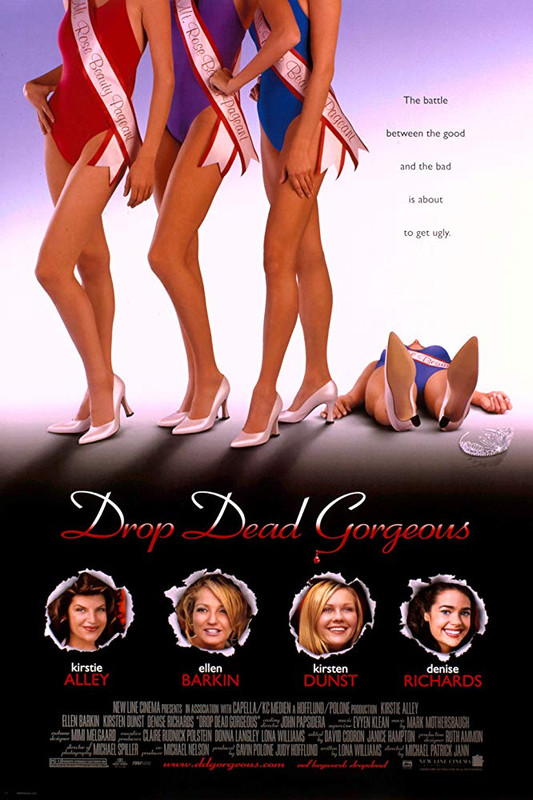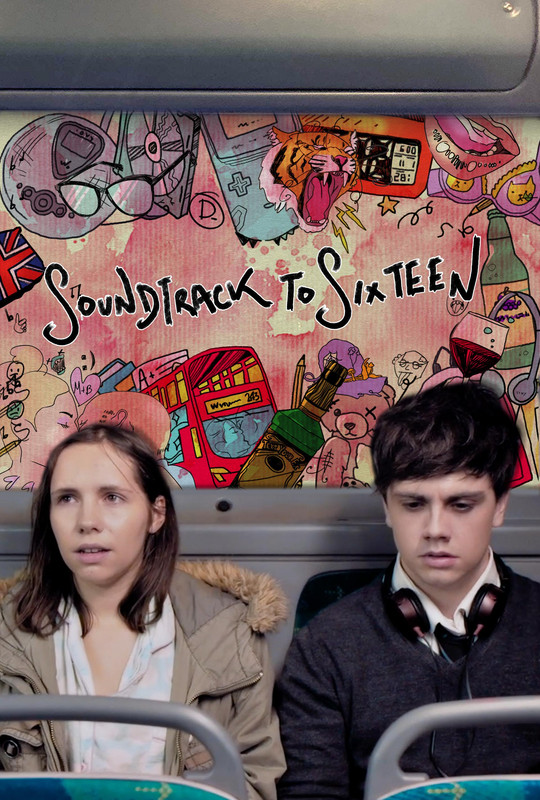Almost a year ago, I kicked off this site with a review of a British coming of age film that I had been fortunate enough to see the first public screening of. Soundtrack to Sixteen, the debut from filmmakers Anna-Elizabeth and Hillary Shakespeare (they co-wrote the screenplay and Hillary directed the film) is a charming teen rom-com set in the early 2000s, with a lot of moments that rang very true for me as I was watching the film.
Back in January, I sat down with Anna and Hillary over drinks at a London cinema, and asked them a few questions about Soundtrack to Sixteen, teen movies and their next film, Much Ado.
At the end of this interview you'll also find MY Soundtrack to Sixteen playlist.
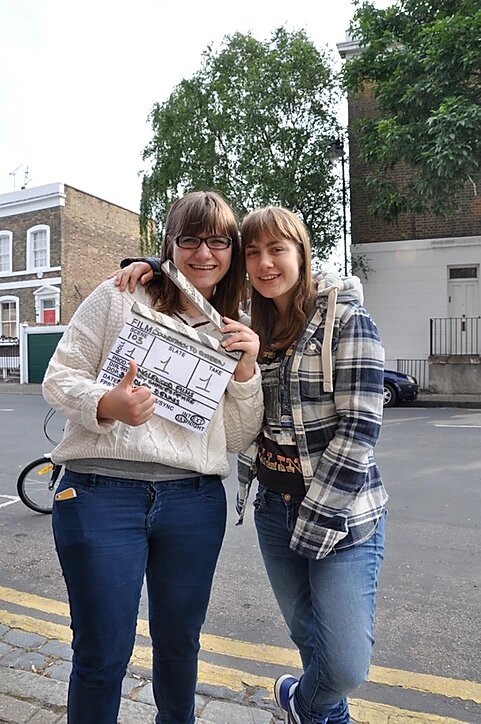 |
| Hillary and Anna-Elizabeth Shakespeare on the set of Soundtrack to Sixteen. |
24FPS: I tend to begin at the beginning so, how did you get into film, and was there a moment that you remember saying ‘alright, this is what I want to do’?
Anna: We did it together as a game. When we were growing up we made lots of silly films and when you’re young fantasy is always slightly blurry with [reality], so we always talked about ‘when this happens we’ll make a film company’, the same way you talk about all the other fantasy jobs you might do.
Hillary: We didn’t plan to do it full time until recently. Even with Soundtrack to Sixteen we weren’t really sure that was what we were going to do. I studied physics, and then after I finished I was thinking ‘I don’t know what I’m doing, maybe I want to do film’, and that’s when we made Soundtrack to Sixteen. Then we both went to uni during post-production, so we still weren’t sure.
24FPS: So making the film was more the catalyst.
Hillary: Yeah, it was like testing it out.
24FPS: Was there something you can identify as the starting point for Soundtrack to Sixteen? What was the first scene you wrote, for example?
Hillary: I guess it was the bus scene. I didn’t actually write it first, but it was the catalyst for it. I was actually on a bus, and I thought that would be a cool title. I was thinking about how when I was little it was sort of my fantasy, because I went to an all girl’s school, that I would just happen on a boy, on a bus [laughs], so that was the first scene I thought of.
Anna: I remember when she came home “I have an idea for a film, it’s called Soundtrack to Sixteen” and I asked “what’s it about”? She was so vague.
Hillary:...Being sixteen
24FPS: Making a teen movie as your first, and to a degree your second film, is that something that came from an interest in the genre, or just where you were in your lives and the resources around you?
Anna: It was kind of the write what you know thing. It’s also a genre we like.
Hillary: Even if they’re bad I quite enjoy them. I guess with people who like horror they just like horror, and I kind of feel that way about coming of age films. So I guess it’s a bit of both, maybe they feed into each other.
24FPS: Teen films or otherwise, were there any particular influences you felt on the screenplay or the visuals with Soundtrack to Sixteen?
Anna: The two things we were thinking of, that we were watching the most, were My So Called Life and Freaks and Geeks. Both series, but they were both quite influential.
Hillary: My So Called Life especially is quite realistic. She’s portrayed as an annoying teenager, but you’re on her side anyway, so it was that kind of vibe we were going for. In terms of the look, I suppose we did Juno and (500) Days of Summer type things, which we really liked at the time.
24FPS: You started writing this a while ago, it’s fair to say. What was the writing process between the two of you then, and have you found that it’s shifted all these years later?
Anna: Yeah, it’s definitely different now. The way we did it then was that Hillary wrote everything.
Hillary: [Laughing] That makes it sound like you didn’t write it.
Anna: No, I was going to say and then I came in. We did the vague outline first, then Hillary would go away and write, then we’d talk about scenes, and she’d write them. I did some edits, I’m not sure I wrote any scenes straight off from start to finish, it was more specific lines where I’d say “get this in”.
Hillary: Because Anna was at school, she was in her last year, and I was on a gap year. I had a whole year to do it, so we’d meet for lunch near her school, discuss what I’d done, and then we’d meet again later when I’d written it.
Anna: It’s quite different from now. We’ve never been able to do that thing where we write physically at the same time, it’s always one of us writes a scene and then swap.
24FPS: There are a couple of scenes in the film that particularly ring true of me at sixteen, which is sad, maybe? There’s the party and the nightbus. So particularly for you Anna, still being at school when you were writing, is there a scene that comes out of that or that feels like that for you?
Anna: Definitely, I think Ben’s story was pretty much what I was going through; thinking that you’re really smart and then suddenly realising that you’re not. I definitely in school, when I was around sixteen, thought I was the shit, basically [laughter]. And then you get cocky and think you don’t need to study. I thought I’m so clever I’ll do five AS Levels and I got… not terrible grades, but pretty bad, I almost failed maths. But my teachers were like ‘oh, we were wrong about you’, not in a mean way, but you know that look. So I was not actually having a rager in the toilets [as Ben does in one scene], but that more than Maisie, who was a bit more Hillary at that age.
Hillary: Yeah, the falling out with people at school and girls being mean, that was more my sixteen year old time and Anna’s was more like the school focused stuff. I think aspects of every scene were taken from reality, that’s kind of the way we write.
Anna: I think that bullying scene though, that was especially intense on the day.
Hillary: Yeah, there were literally lines taken out of reality for that one. I remember one of the crew asking ‘don’t you think this is a bit unrealistically mean’? I was like, “No, it’s real”.
24FPS: You’re both credited as writer but Hillary, you’re the credited director, so how did that writer/director dynamic work on set and is that something that’s shifted with Much Ado?
Anna: Back then, I think I had a lot more fun than Hilary actually, because I got to hang out with the actors more like, messing around, but I mostly gave her my notes if I had any, so everything would go through her. She was directing, but sometimes I would notice things. Especially when there was so much going on and the crew was so small it was good to have two pairs of eyes on things, but I would never talk to the actors about their performance.
Hillary: Partly then it was about Anna still being in school, she didn’t have the time commitment. It was both of our vision; we wrote it together and all the post-production we’ve both given all the same feedback, but on the actual shoot, I think you weren’t around as much, you were actually gone for some of it as well. So that’s why we decided I’d direct it, but Much Ado we co-directed all the way through.
24FPS: One thing I really like about the film is that you’ve got a good sense of all the social groups, so how did you manage to first find that in casting and then encourage it on set with the actors?
Anna: I think the first day with the boys was the football day, so that was really good for breaking the ice. There wasn’t much they had to do other than play football badly, which was quite fun as well because they asked if they were supposed to be good at it, but we said ‘no, it’s just average boys playing football badly’. It felt like there was enough time, when I compare it to Much Ado there was a lot less stress, at least for them.
Hillary: I think they just ended up hanging out a lot, the boys especially. The girls had less time together because they were two groups of girls so each individual group had less screen time together, so they had a bit less time to bond.
24FPS: Did you have rehearsal time at all?
Hillary: We only did rehearsals with Gino and Scarlett, the main two.
Anna: We had Gino there, who plays Ben, to cast the others, so we did test them all against him, cause we cast the main two first and then cast the rest of the groups around them, so that definitely helped.
24FPS: The title has a literal meaning in the film, are the mix CDs something that you did, and what would be on your Soundtrack to Sixteen?
Anna: That’s quite fun. We didn’t do them, they just came up, I think it was Hillary’s idea.
Hillary: It was more like I wished we’d done them.
Anna: But our soundtrack to sixteen, and that’s definitely what we were writing it to, was a lot of Blink 182 and Sum 41 and those teenage bands. Hillary had those Minidiscs and she got, what was the one…?
Hillary: Yeah, I only ever used to listen to basic pop music, cause I didn’t really know how to find music. I used to swap Minidiscs with a friend and one day her brother’s disc got mixed up in them and it was this massive discovery of boys music.
24FPS: The film is set in the noughties, several years before it was shot. So what was it specifically you wanted to capture about that time?
Anna: We definitely wanted it to be set when we were sixteen, so that’s why it’s in the Noughties. We wanted to do it before social media, and there are no proper phones in it, they’re all brick phones.
Hillary: I think the experience of being sixteen must be really different now, and we haven’t really had that. Comparing it to Eighth Grade that's probably more like what it’s like for teenagers now with being constantly online, that wasn’t really part of our teenage experience. I think we wanted to set it in that time because the story we wanted to tell, hopefully it’s relevant, but it’s not exactly what people are going through now.
24FPS: The film’s taken quite some time to get from shooting to screen. Looking at the good side of that, what do you think has been the most beneficial thing to come out of that extended process for you and for the film?
Anna: We were really good at being savage with it, I think, we knew what needed to go by the time we were cutting it, which was already a few years down the line.
Hillary: We were quite detached by the time we were editing. I think part of the reason it was so slow was that we were learning, it was our first film so every time we had to do something new we had to learn how to do it. That slowed things down, but it was good for us. Also we did degrees in the meantime.
24FPS: Does it play differently for you now?
Anna: It’s hard to tell because it changed so much. The first version… was a bit of a mess. I think I was more nervous about it. I still get nervous every time we watch it with people, I find it so nerve-wracking, watching people watch your thing.
Hillary: There were a lot of storylines that got cut out. We had a lot more family life and the editor Ben suggested we took the focus off their families and then, it just got a lot better.
24FPS: Something you often notice in coming of age films, the parents just aren’t that important a lot of the time.
Anna: Yeah, we had a whole sub-plot about Ben and his Dad’s relationship. That was in the first edit and it just wasn’t really relevant. In theory, the idea was his Dad cared about him doing well at school, therefore the pressure meant something more, but it actually didn’t really build the pressure, so we just got rid of that whole sub-plot, and it was better.
24FPS: You’re obviously young, female, filmmakers and it’s a time when there’s a lot more focus on women behind the camera. What’s your experience been like in those terms, and would you have any advice for other young women who want to go out and make films?
Hillary: I think we’re in a really good time. For us, we’ve just come into it at the right time. But because I come from a science background, I did find it really hard. I was in a robotics lab where there were barely any girls. I feel like that’s a totally different world.
Anna: Just for context, after she did physics she did computer science, and then AI
Hillary: And those were really male-dominated worlds, where I felt it was really hard to be a girl in that world. By comparison, I think we’ve come into [filmmaking] at such a good time, it feels like a revelation that everyone wants to help.
Anna: I feel like I need more advice than I can give advice. I guess using what’s available. There are definitely things open right now which are for women in film, so I feel like there’s a lot of opportunity. You might think ‘I don’t want to be sub-categorised into that’, when it becomes a genre - ‘Women in film’ - but then it becomes ‘I’ll just get over myself actually, I want help’. [Laughter].
24FPS: You’ve said there’s a lot of things you learned on Soundtrack to Sixteen, and I assume on Much Ado as well. Of all of those, what are the one or two you most want to carry forward into your next films.
Anna: With Soundtrack to Sixteen we were a lot slower, because I used to think you have to give people loads of time to get good stuff out of them, but then I realised that’s not actually true, you just have to be pushing it 24/7. Obviously we weren’t because we were doing degrees, but I just thought that’s how it would be anyway, and I was wrong there. When things slow down now I know there’s something I can do to push them along. That was quite a big lesson.
Hillary: We’ve learned quite a lot on the sales side, about how difficult it is to sell an indie film. I guess I’d want a higher budget for future films.
24FPS: So your next film, Much Ado, re-setting the play at university. First of all, why that play in that milieu?
Anna: We chose Much Ado because we just love that play so much. The Kenneth Branagh version was our favourite videotape.
Hillary: We had about four videotapes and that was one of them, so we knew it practically by heart by the time we wanted to make it.
Anna: We’d wanted to make it long before. When the Joss Whedon version came out, when we were really quite young, I thought ‘Damn it’, ‘cause I wanted to make the next one.
Hillary: When I was really little the RSC, their home base was the Barbican, and I used to go to all of their plays. Much Ado was the first one, I think, that I really understood. I loved it so much, I made my parents take me back, and my Grandma took me again.
Anna: We’ve been talking about how we’d do it for a long time. When Hillary quit her PHD and we decided we were going to do this, we obviously wanted to finish Soundtrack to Sixteen, but we’d done most of that and were waiting on other people, and we wanted to go into something right away. We’d almost adapted it already, by talking through what we wanted to do for so long, so we were ready to go.
24FPS: You’re keeping it in Shakespearean English?
Anna: Yeah, and it’s still set in the countryside, it’s a university rugby team at a house, so for example the scenes where Benedick is hiding, those are still in the vines, so those bits still have the same vibe. I think a lot of it makes sense, it being really young people because the behaviour is immature and it makes sense when you realise they’re 18 or 19, other than the marriage, which took some work to adapt. It felt like a natural step because it was a genre and a play we knew really well.
24FPS: I always close interviews with the same question. Not counting your own, what’s the last great movie you saw?
Anna: Marriage Story is the last film we both loved. We saw that at the Austin Film Festival with a big audience, and I cried multiple times.
Hillary: We’ve watched a lot of films lately because we were doing a festival tour and I kind of remembered what it was like to watch films that I loved.
Anna: That seemed a bit obvious, because everyone loves it, so our rogue one… it’s called Jeune Juliette and it’s a French Canadian coming of age film about a girl, she’s overweight and her best friend who’s a girl has a crush on her, but she’s not a lesbian, and she likes a guy who’s a dick.
Hillary: I also liked this coming of age film we saw at Austin Film Festival called Yellow Rose, it’s about a girl whose mum gets deported and she’s trying to hide, but also she’s trying to become a country singer.
24FPS: I haven’t heard of either of those.
Hillary: That’s why we chose them, we wanted to have something you hadn’t heard of.
With that we wrapped up. Many thanks to Anna and Hillary for their time. You can see Soundtrack to Sixteen (which I still highly recommend) on its tour of UK cinemas, check out dates and book tickets at their website. It will be available on VOD soon after that tour concludes.
Finally, as a bonus, here is my Spotify playlist of my Soundtrack to Sixteen. I was that age in 1997 and this list, which is in no order but that in which I thought of the songs, is full of music that was part of the fabric of my life that year (whether I liked the tracks at the time, or indeed now, or not).



